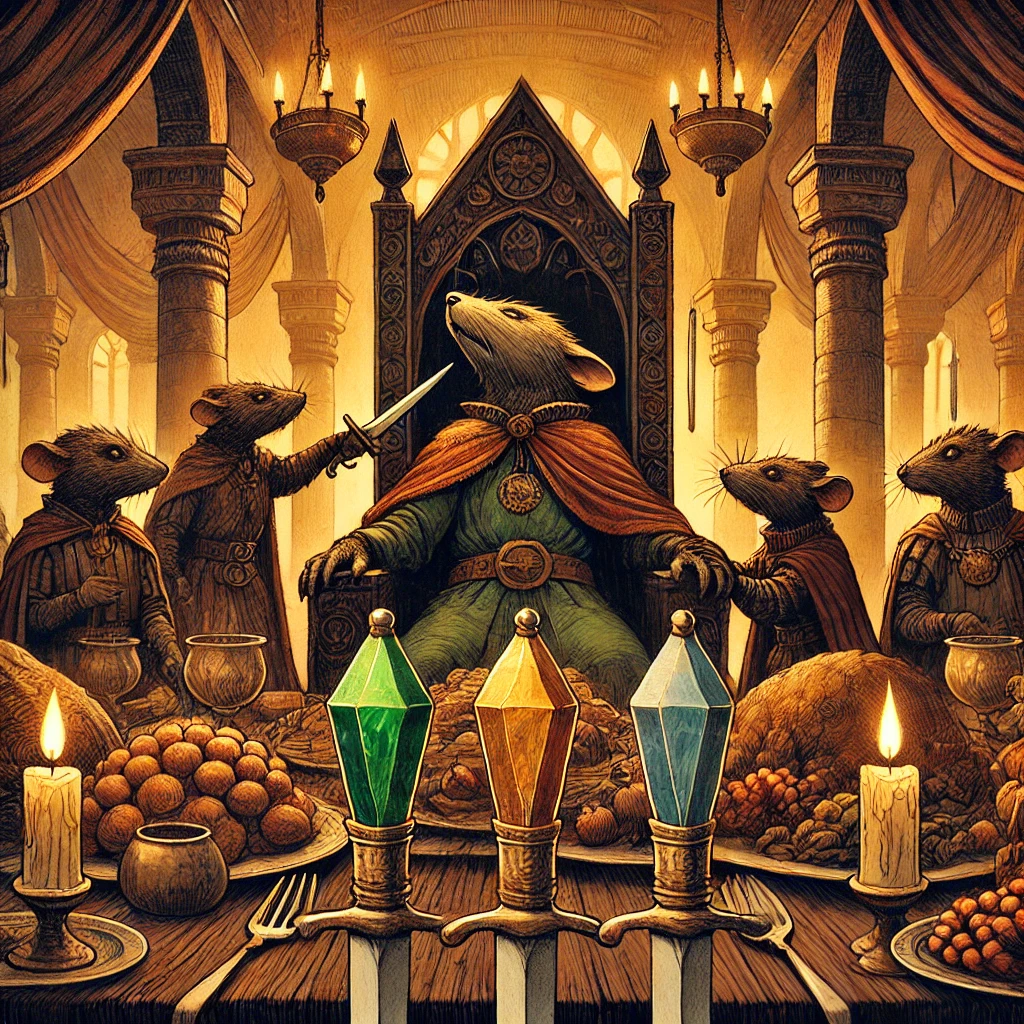The Grand Empire (900 Years Ago)
Long ago, the land was ruled by a grand empire—an unparalleled beacon of civilization, its cities gleaming with white stone and its roads connecting distant lands under a single banner. Protected by legions of warriors, this empire was the largest and most powerful to ever exist. At its height, it flourished in art, technology, and unity.
This golden age began to dim under Imperator Julianus, a cunning rat whose ambition knew no bounds. Around 4 BCE, he led aggressive campaigns against the "uncivilized" lands, raising countless armies and draining the empire's vast treasury. Weapons were forged en masse, and battles were fought and lost in mere seasons, but the heart of the empire, Romas, remained untouched by the chaos Julianus unleashed.
However, Julianus' council, weary of war and betrayal, conspired against him. During a great feast, they assassinated him with twelve daggers, one for each family he had wronged. Legends say the daggers became the twelve months, and four of them—Emerald, Gold, Brass, and Silver—symbolized the seasons.
The death of Julianus rippled across the empire like a dark tide. With no leader to hold it together, chaos swept through its lands. Fire and blood consumed its heartlands, and the empire crumbled into ruin.

The Dark Age (400 Years Ago)
For centuries, the land languished in darkness. Civilization's once-bright flame flickered and almost went out. Forges cooled, knowledge faded, and even the simplest crafts became lost. The roads of the empire fell silent, and nature reclaimed its dominion.
But from this despair arose St. Benedict of Redhouse, a humble yet determined mouse who clung to the old ways. With his followers, he traveled the land, establishing abbeys and monasteries as sanctuaries of learning and faith. His scribes preserved the knowledge of alchemy, metallurgy, and agriculture, keeping the embers of civilization alive. While the world remained bleak, St. Benedict's efforts became the foundation for the eventual revival of society.
The Age of Feudal Lords (200 Years Ago)
The world began to recover, but it was fractured. The central woodlands became a patchwork of feudal territories, each ruled by a lord. Among them, King Lupis, a wolf, rose to dominate vast lands. He ruled with cruelty, enslaving many and enforcing his will with brutal strength.
His tyranny ended with the rise of Charlemagne, a noble badger who led a rebellion fueled not by a thirst for power but by a desire for justice. Armed with ancient weapons from the fallen empire, Charlemagne defeated Lupis in a bloody campaign, his final victory marked by the wolf’s blood staining the stones of his keep.
Though victorious, Charlemagne was haunted by the violence. Swearing an oath to never harm another beast, he turned away from conquest. Despite his reluctance, the woodlanders crowned him king, and he established the Guard of Redwall to maintain peace. He distributed the weapons of the lost empire and authored the Law of the Woodlands, a code to ensure harmony and justice without violence.

Law of the woodlands
By decree of the Great King, these laws guide all who dwell in the realm:
- The Ban of Blades: No citizen shall possess or craft weapons of war. Tools for labor, such as farming implements, are permitted but must not be altered for harm.
- The Law of Words Before Actions: Disputes must be settled through dialogue or mediation by a chosen elder or council. Resorting to physical conflict is forbidden.
- The Rule of Open Hands: All trade, negotiation, and interactions between settlements must be conducted with honesty and goodwill. Cheating or exploitation is a crime against harmony.
- The Oath of Sanctuary: Any individual seeking refuge from harm shall be granted safety within any settlement, regardless of origin or past deeds, until a fair resolution is reached.
- The Bond of Sharing: Those with surplus food, materials, or labor shall aid those in need. Hoarding in times of crisis is an act of betrayal to the community.
- The Circle of Care: The elderly, the young, and the infirm must be cared for by their community, ensuring no individual is left to suffer alone.
- The Path of Reconciliation: Those who commit offenses must make amends through service to the injured party or the community. Retribution is forbidden; justice is restorative, not punitive.
- The Right to a Hearing: No citizen shall be condemned or punished without a fair hearing before a council of peers. The accused may speak in their own defense.
- The Song of the Land: The forests, rivers, and animals are sacred. Acts that harm the balance of nature, such as needless destruction or waste, are forbidden.
- The Light of Learning: Every citizen has the right to education and the sharing of knowledge. Ignorance is the seed of fear, and knowledge is the root of peace.
Enforcement of the Laws
Instead of armed enforcers, the Great King envisioned a society where trusted Elders, Mediators, and Councils of Peers uphold these laws. Communities are encouraged to resolve disputes collectively, ensuring that justice reflects the values of compassion and understanding.
The Reign of the Guard (20 Years Ago)
Over the centuries, the Guard of Redwall grew into an entrenched institution, building their bastions upon the ancient monasteries of St. Benedict. To maintain peace across the vast woodlands, they turned to ancient alchemical knowledge and the wisdom of the past, creating the Scent Wall—a real and powerful barrier crafted from rare herbs, alchemical compounds, and the cooperation of the land's druids and herbalists.
The Scent Wall emits a pervasive, invisible aroma that repels the deadliest beasts, keeping them at bay and ensuring the safety of the settlements within. It is a fragile but effective protection, requiring constant maintenance and the rare ingredients that only the most skilled alchemists and herbalists can provide.
The creation of the Scent Wall marked a golden era for the woodlands, as the beasts believed they were finally free from the horrors of predatory threats. Trade flourished, settlements grew, and peace reigned. Yet, this great achievement came at a cost—the ingredients for the wall grow increasingly scarce, and its maintenance demands resources and effort the Guard struggles to sustain.
The Scent Wall is both a triumph and a burden, a testament to the ingenuity of Mosswood’s inhabitants and a constant reminder of the fragility of their peace. Should it fail, the safety of the land would be undone, and chaos would return to the woodlands.
Today, 860 CE
The woodlands thrive once more, but the echoes of the past remain. The empire's roads are gone, and its grand cities lie buried beneath moss and trees. New ways have emerged, and the beasts of Mosswood find strength in community and cooperation.
However, challenges loom. The Guard, stretched thin, struggles to maintain order. The lies they built their stability upon grow fragile, and whispers of famine creep through the land. The reign of Prince Thornwrek, an ambitious fox, threatens to shift the balance of power, as more guards are recalled to Redstone Keep, leaving the villages vulnerable.
The world of Mosswood balances on a delicate edge, its fate resting not in the hands of lords or rulers, but in the hearts of every beast—from the smallest shrew to the mightiest badger. This is a time for heroes, for those brave enough to shape the future and carry the light of hope into the unknown.
